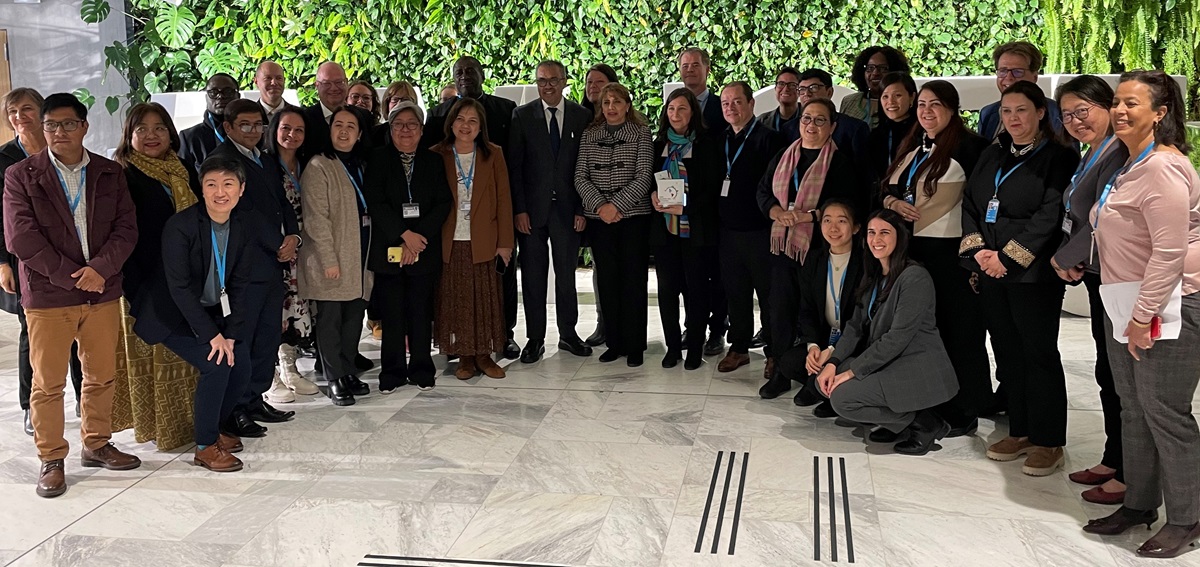
Mayors and representatives from 7 cities visit Switzerland from 19-22 November 2023, as part of the 3rd Mayors Dialogue. The dialogue is part of the WHO global initiative on Urban Governance for Health and Well-being (2020-2028), that has enabled experience and knowledge exchange to inspire innovative and practical ways of shaping cities to create health and well-being for all. The programme is supported by the Swiss Agency for Development and Cooperation (SDC).
Mayors and city representatives from Gualeguaychú (Argentina), Khulna (Bangladesh), Douala (Cameroon), Bogota (Colombia), Quito (Ecuador), Mexico City (Mexico), Pasig (Philippines), and representatives from the Swiss cities of Bern, Lausanne and Geneva, came together with SDC representatives and WHO technical officers, to take part in a three-day study visit in Bern, Geneva, and Lausanne. The annual Dialogue, coupled with visits to city-led initiatives, has served as a platform for mayors to reflect on their work to promote health and well-being through multisectoral and participatory governance mechanisms.
“These mayors’ dialogues have been organized as a platform for cities to share innovations and concerns. Although, contexts may differ, there are many commonalities and questions that local leaders may have and want to share. Having a global network of city leaders such as this, is a powerful way to ensure global agendas are relevant to local realities and vice-versa.”, said Dr Ailan Li, Assistant Director-General for Universal Health Coverage, Healthier Populations at WHO.
Starting their visit in Bern, the capital city of Switzerland, Mayors were introduced to Switzerland’s federal system and how it sets the foundation and enables participative governance at local levels, while Mayors from several regions shared their experience. Over the three-day visit, the visiting mayors exchanged lessons learned and heard about the cities’ strategies to promote health and well-being, how communities’ voices are heard and how communities participate in decision-making processes.
In Bern, Mayors visited city-led initiatives aimed at increasing the participation of migrants and fight against discrimination, promoting the use of bicycles through its “Velo Offensive” initiative, and strengthening social cohesion through neighbourhood organizations such as the Association of Bernese Community Work. “The way in which the city of Bern is developing cycle paths. It is a great initiative and a way to ensure soft mobility. It gave me ideas for Douala.”, said Dr Roger Mbassa Ndine, Mayor of Douala, Cameroon.
In the city of Lausanne, the largest French-speaking city in the Canton of Vaud, Mayors visited the “Ecoquartier des Plaines-du-Loup” to understand how the city addresses environmental, social and economic concerns through urban planning, and how urban sports and physical activity are promoted through the Halles sportives de Beaulieu and the Campus Santé of the UNIL-EPFL. “We are hearing from the experiences of Lausanne on how urban governance can improve environments and consider social determinants of health. Through the Ecoquartier des Plaines-du-Loup, we can see how health and well-being is promoted by making neighbors environmentally sustainable, preserving public spaces, and improving mobility”, said Ms Yeimy Carolina Agudelo Hernandez, Mayors of Alcadia de Kennedy in Bogota, Colombia.
In the city of Geneva, the “capital of peace”, Mayors visited a school canteen to learn about the city’s strategy to promote heathy eating in schools through the “Fourchette Verte Junior” label and the “Cité Seniors” – a social center that serves as a key information and meeting point for seniors to participate in activities and events. A group also traveled to Vernier, the second largest city in the State of Geneva, to hear about the “Contract de Quartier”, a participatory tool for residents and neighborhood organizations to propose projects to improve their daily life. “The lesson that I take with me, and I am going to put into practice in the mayor’s office, is the way to better plan for meal that include more vegetables in the menus since this would favor healthy eating, education for parents, and lowering its cost as the city has a high local production of vegetables.”, said Ms Judith Vanegas, Mayor of Milpa Alta in Mexico City, Mexico.
The event ended at WHO Headquarters, where mayors met with the WHO Assistant Director-General for Healthier Populations and technical leads; heard from the Global Cities Hub how city networks can contribute more effectively to multilateral processes; and participated in a discussion to share their reflections and thoughts moving forward on governance for health and well-being.
By creating health-enabling and health-promoting physical and social environments, establishing processes for citizens to be heard and to engage in decision-making, and by ensuring different sectors and disciplines work together, cities can be designed to address the determinants of health and promote health and well-being for all.
“Health is created outside the health sector, and we know that cities are complex ecosystems with multiple drivers affecting equity, health and well-being. Urban planning that considers infrastructure design and access to essential services requires multidisciplinary, multisectoral and multi stakeholders’ collaboration to ensure responsiveness and sustainability of the efforts and investments.”, said Dr Ruediger Krech, Director of the Health Promotion Department at WHO.
This will also contribute to the achievement of WHO’s Mandate, and the Sustainable Development Goals (SDGs), particularly SDG 3 (Good health and well-being) and 11 (Make cities and human settlements inclusive, safe, resilient, and sustainable). “As you know Governance is an essential component of the Healthy Cities Initiative. It is about local political leadership, organizational and administrative structures within local authorities to enable active engagement and co-designing solutions to local issues for people. For this reason, the sustainability of this hard work and investment relies on institutionalising participatory mechanisms.”, said Dr Ailan Li, Assistant Director-General for Universal Health Coverage, Healthier Populations at WHO.
For more information, please contact: [email protected]
